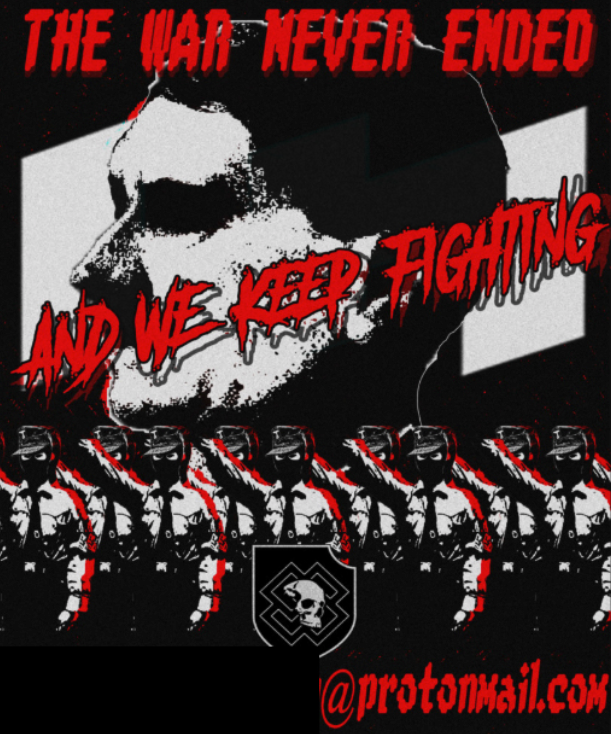Minds, the ‘Anti-Facebook,’ Has No Idea What to Do About All the Neo-Nazis
Credit to Author: Ben Makuch| Date: Tue, 28 May 2019 18:00:34 +0000
A social network described as the “anti-Facebook” has become a haven for neo-Nazis connected to militant hate groups, Motherboard has found.
Minds is a US-based social network that bills itself as being focused on transparency (its code is open source), free speech, and cryptocurrency rewards for users. Much of the recent media coverage around Minds, which launched in 2015, has focused on how it challenges social media giants and its adoption of cryptocurrency, while also noting that the site’s light-touch approach to content moderation has led to a proliferation of far-right viewpoints being shared openly on its platform.
In recent months, major tech companies such as Facebook and Twitter have taken controversial, if incomplete, steps to ban white nationalism and crack down on far-right content on their platforms. Upstart social media sites such as Gab (a Twitter-esque site known for its far-right users) have moved in. Minds isn’t quite as popular as Gab, but the far-right has burrowed into the platform in recent years.
Under-scrutinized sites like Minds—which often have less rigorous moderation rules and practices than some social media giants—allow hate groups to exist unfettered online, even when platforms with millions of users like Facebook and Twitter deplatform them. Minds is working on letting users moderate content using a “jury system” that lets users vote on whether content should be allowed on the site.
Motherboard was led to Minds after tracing the online footprints of far-right groups including Atomwaffen Division (an American hate group connected to several murders) and the Europe-based Feuerkrieg Division, which bills itself as an underground paramilitary group and has called for political assassinations. On Minds, social media profiles connected to these groups maintained accounts.
In addition to these self-styled paramilitary groups, there are Minds accounts linked to Patriot Front, a white nationalist organization associated with the neo-Nazi who killed Heather Heyer at the 2017 “Unite the Right” rally in Charlottesville, and the Canadian chapter of Generation Identity, a global hate group that came under fire after it was revealed the Christchurch terror suspect had donated money to one of its European chapters.
One tactic adopted by far-right extremist groups to maintain a pipeline of communication with interested recruits amid social media takedowns is to advertise encrypted email addresses and link accounts between platforms.
A post on the Minds account linked to Feuerkrieg Division from May 19 advertised the group’s parallel account on Gab and openly displayed its ProtonMail email address. This group is already being monitored by terrorism trackers TRAC analysis consortium and the not-for-profit Counter Extremism Project (CEP).
Do you know something about an extremist group and their activities online? We would love to hear from you. Using a computer or phone, you can contact Ben Makuch securely on Telegram @BenMakuch or email ben.makuch@vice.com.
Atomwaffen Division’s Minds account, while inactive since mid-2017, has still garnered close to 20,000 view on the site.

When initially contacted by Motherboard, Minds founder Bill Ottman said that neo-Nazi content on Minds “sucks,” but that he thinks Minds is a place where civil discourse with extremists can de-radicalize them.
In recent months, Ottman has gained mainstream attention for interviews he gave to Joe Rogan on his podcast and to controversial Fox News personality Tucker Carlson on the dangers of social networks impinging on American free speech.
“These people are pretty sick individuals, but you have to zoom out and ask yourself: what is happening on the internet as an ecosystem?” Ottman said. “We would argue, it’s irresponsible of the big networks to be pushing all of these users into these other darker corners of the internet.”
Minds, as a whole, clearly aims to allow content on its platform that would not be acceptable elsewhere. However, its content policy states that posting content regarding terrorism or “true threats” of violence are bannable offenses.
After Motherboard shared six accounts it identified as being linked to neo-Nazi or otherwise hateful groups on Minds—and noting that the site’s own policies bar terrorism-related content—the company banned Atomwaffen Division for “terrorist activity,” and Feuerkrieg Division and another neo-Nazi account for “inciting violence.”
“Thank you for the reports and context. We have taken action on multiple accounts and the others are under investigation,” Minds told Motherboard in a statement.
One of the banned accounts was the creator of a neo-Nazi propaganda group on Minds with more than 350 members, but the group page itself remains online. It is highly active, with several new posts on Friday alone, including a lengthy post trying to demonstrate that the Holocaust didn’t happen.
Minds currently has a content moderation team of “about five” people, Ottman said, and their job is to go through the report queue and mark flagged posts as being not safe for work (NSFW), or ban the offending account.
On Minds, images referencing anti-semitism, Nazism and neo-Nazism, white supremacy, and more are all plainly visible. However, some posts are sporadically semi-obscured behind an age block, suggesting the content is OK for adults.
On the Feuerkrieg Division-linked account, before it was banned, Motherboard spotted a swastika image that was slightly blurred and asked the user to confirm their age as being older than 18 to un-blur.

In the neo-Nazi Minds group with over 350 followers that was not banned, images depicting overtly hateful and neo-Nazi content are currently visible, while some posts were hidden behind an age block. One post, which appears to dox someone described as a “race traitor,” is plainly visible. Minds’ content policy says that doxing is grounds for a ban.
“The extreme right is always going to look for loopholes in content policies when it comes to propaganda and encouraging violence. The variable is where social media companies draw the line and decide that they don’t want to assist in this endeavor,” Joshua Fisher-Birch, of the Counter Extremism Project, told Motherboard in an email.
Last week, Minds launched another layer of site governance to manage inflammatory content on the site, while juggling its outward commitment to “free speech.” The system allows users to vote on the permissibility of restricted content through an ad hoc jury system.
Currently, after the Minds team takes action on a flagged post, the account owner can appeal the decision. When that happens, 12 users are randomly selected and asked to participate in a vote in a pop-up. If 75 percent of the jury agrees to reverse the Minds team’s decision, the appeal is successful. If not, the decision stays. Users on Minds get three strikes unless the offense falls under the “immediate ban offense” category.
Since the jury system doesn’t give users an initial say on content—that stays with the Minds team—right now the jury is simply an opportunity for users to say if they want to keep banned or restricted content on the site.
Minds said it plans to extend the jury system to handle initial reports as well as appeals. The site also claims to have developed an automated system for finding posts that violate site standards, and for surfacing the most urgent user reports for the moderation team to handle.
“We are dedicated to free expression and transparency as the antidote to radicalization, violence, and extremism,” the statement said. “The goal with the jury system is to have a more democratic and fair process for reviewing moderation decisions as opposed to forcing the community to adhere to the subjectivity of a single centralized authority with no transparency.”
Another defining feature of Minds is its implementation of cryptocurrency tokens called Minds that users earn from using the site. Users earn tokens based on their contribution to Minds—accounts that get more engagement earn more tokens—or buy them for the cryptocurrency equivalent of 15 cents USD.
These tokens can be used to boost posts in other users’ timelines, or as a currency of sorts between users (for example, as part of a content-sharing agreement), or to purchase premium features on Minds. “One token gives you 1,000 impressions extra, and we serve them chronologically based on who’s refreshing their feed,” Ottman said.
Far-right accounts on Minds have already benefited from its contribution-based token economy. In most cases, there isn’t a whole lot of money changing hands, but tokens on Minds can be used to spread far-right messages much further than they would organically.
Fuerkrieg Division’s Minds account had accrued one wire—a payment between users to reward creators or tip—and five tokens. Its page, littered with anti-semitic tropes and propaganda urging its followers to “take action,” earned over 27,000 views.
Another account banned by Minds after Motherboard raised the issue had close to 550,000 views and garnered 38 tokens and four wires. One of its posts featured a cartoon image of a Jewish man being lynched.
Minds has the ability to effectively demonetize accounts on the platform, according to Ottman. “In terms of, do we have the ability to stop users from earning [tokens]? Theoretically, yeah, we do,” he said.
It’s a moot proposition for Minds, Ottman said, because if an account was behaving badly enough to be blocked from earning tokens through the site (though they could conceivably purchase them through other means), then it would simply be banned.
Minds’ approach is out of step with mainstream social media networks, which despite their slow actions, have taken steps to curb far-right extremism on their platforms after widespread public outcry.
“Consistent Terms of Service and content policies paired with robust and consistent application across multiple platforms would prohibit violent and harmful actors from abusing these sites,” Fisher-Birch said.
Minds’ approach appears to be, at least in some ways, double-edged. According to an Agence France-Presse report, over 100,000 people in Vietnam flocked to Minds after the country’s government passed a law cracking down on dissent online and citizens feared that Facebook might scrub political discourse in accordance with Vietnamese government policies.
Regardless, it’s clear that the same approach has made Minds a place for white supremacist and neo-Nazis, as well as their affiliated organizations—which claim to be armed and ready for violence—to link up and stay connected online.
Listen to CYBER, Motherboard’s new weekly podcast about hacking and cybersecurity.
This article originally appeared on VICE US.